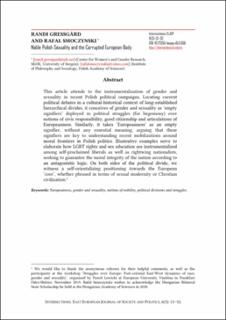| dc.contributor.author | Gressgård, Randi Elin | |
| dc.contributor.author | Smoczynski, Rafał | |
| dc.date.accessioned | 2021-06-08T13:29:15Z | |
| dc.date.available | 2021-06-08T13:29:15Z | |
| dc.date.created | 2021-01-25T12:29:33Z | |
| dc.date.issued | 2020 | |
| dc.identifier.issn | 2416-089X | |
| dc.identifier.uri | https://hdl.handle.net/11250/2758540 | |
| dc.description.abstract | This article attends to the instrumentalization of gender and sexuality in recent Polish political campaigns. Locating current political debates in a cultural-historical context of long-established hierarchical divides, it conceives of gender and sexuality as ‘empty signifiers’ deployed in political struggles (for hegemony) over notions of civic responsibility, good citizenship and articulations of Europeanness. Similarly, it takes ‘Europeanness’ as an empty signifier, without any essential meaning, arguing that these signifiers are key to understanding recent mobilizations around moral frontiers in Polish politics. Illustrative examples serve to elaborate how LGBT rights and sex education are instrumentalized among self-proclaimed liberals as well as rightwing nationalists, seeking to guarantee the moral integrity of the nation according to an antagonistic logic. On both sides of the political divide, we witness a self-orientalizing positioning towards the European ‘core’, whether phrased in terms of sexual modernity or Christian civilization. | en_US |
| dc.language.iso | eng | en_US |
| dc.publisher | Centre for Social Sciences | en_US |
| dc.rights | Navngivelse 4.0 Internasjonal | * |
| dc.rights.uri | http://creativecommons.org/licenses/by/4.0/deed.no | * |
| dc.title | Noble Polish sexuality and the corrupted European body | en_US |
| dc.type | Journal article | en_US |
| dc.type | Peer reviewed | en_US |
| dc.description.version | publishedVersion | en_US |
| dc.rights.holder | Copyright 2020 The Authors | en_US |
| cristin.ispublished | true | |
| cristin.fulltext | original | |
| cristin.qualitycode | 1 | |
| dc.identifier.doi | 10.17356/ieejsp.v6i3.656 | |
| dc.identifier.cristin | 1878348 | |
| dc.source.journal | Intersections. East European Journal of Society and Politics | en_US |
| dc.source.pagenumber | 13–32 | en_US |
| dc.identifier.citation | Intersections. East European Journal of Society and Politics. 2020, 6(3): 13–32 | en_US |
| dc.source.volume | 6 | en_US |
| dc.source.issue | 3 | en_US |

